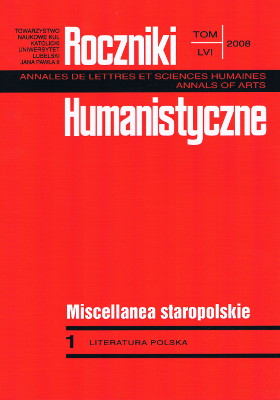The Good Man in Mikołaj Rej’s Źwierzyniec
Abstract
The author compares Mikołaj Rej’s Źwierzyniec and Żywot człowieka poczciwego on their thematic, philosophical, symbolical, and lexical levels. She points at the similar sources of anecdotes and written images. Two issues have been discussed: the hero’s (the good man’s) attitude to the village and steadfastness and moderation as two main virtues that characterize the gentry man and landowner.
In the above two works the village is treated as a source of independence and safety, the values that make the nourishing of virtues possible. Rej teaches the reader of his parenthetic writings how to stay unmoved, how to be prepared for the turns of fortune, how to prevent the fall and be satisfied with one’s life, without trying to accomplish something unreal at any cost. Those who fail to have the virtue of steadfastness fall under harsh criticism. In the two works moderation is spoken of in similar terms. Rej, neo-stoic and proponent of the strict Protestant ethics, claims that well-being is the gift from God, estate is important when it is gained thanks to one’s own work. Being attached to it, however, does not take on the form of avarice and greed. Rej criticises those who become slaves of riches, and also those who suffer from scarcity because of their own laziness.
Copyright (c) 2008 Roczniki Humanistyczne

This work is licensed under a Creative Commons Attribution-NonCommercial-NoDerivatives 4.0 International License.





